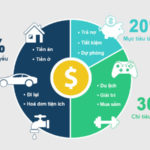 |
|
It is important to plan your short-term and long-term goals to ensure financial stability. Illustration: Cottonbro/Pexels. |
How many times have you made a purchase, spent a significant amount of money, brought it home, and quickly grew tired of it?
This is an example of impulsive shopping or impulse buying, which is a leading cause of overspending. Running out of money can negatively impact your mental well-being.
Psychology Today suggests three ways to help you control your impulsive shopping habits and improve your financial and mental health.
Create a plan
If you want to reduce or eliminate impulsive spending, create a personal financial plan that spans a short-term cycle of about 7-21 days. After that, switch to cash payments instead of using cards or online transactions. Seeing your cash decrease will make you more aware of the need to save.
In addition, try to cook at home, make your own coffee, or repurpose old clothes. Setting clear spending goals will make you accountable and uncomfortable. Consider partnering with a family member or friend to embark on this journey together for added motivation and reminders.
 |
|
Impulsive shopping is a major cause of overspending. Illustration: Anastasia Ahuraev/Pexels. |
Understand why you spend
Once you have a spending plan in place, identify the people, places, or reasons that may trigger your desire to shop. This could include influencers, celebrities, or discount programs offered through shopping apps on your phone.
By understanding the motivations behind your shopping behavior, you can learn how to respond effectively. For example, if you find yourself frequently tempted by sales from specific brands or e-commerce platforms, consider unsubscribing from their emails, messages, and notifications on your phone.
If you tend to shop impulsively because you always have cash on hand, enlist the help of a family member to assist with managing your finances or consider locking your bank cards away.
Ask questions before making a purchase
Prior to spending money, ask yourself:
- Is this item or service truly necessary?
- What benefits does this expense bring to my personal, professional, or financial goals?
Develop the habit of taking “waiting moments” for yourself. This means that when you come across an item you like, refrain from making an immediate decision. Instead, add the product to your shopping cart and revisit it after a few days of consideration.
Try implementing this approach and take note of the benefits and impacts you observe within a week. Discuss your experiences with a friend or therapist for further insights.
Source: Zing





































